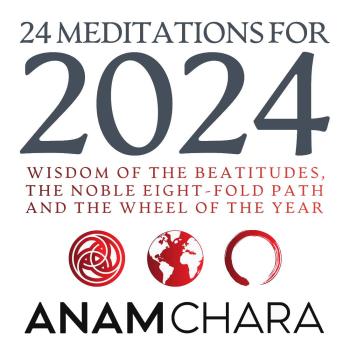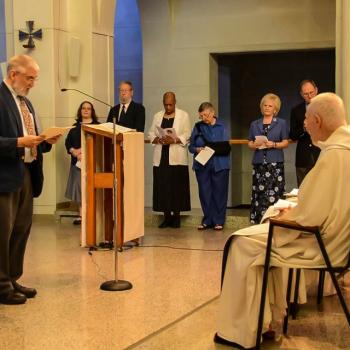
A reader of my blog wrote to me and asked this question:
What do you see is the difference between Catholic meditation and contemplative prayer?
It’s a great question, made complicated by the fact that words like meditation and contemplation can be used in a variety of ways, especially in society at large.
For example, many people may associate “meditation” with eastern or secular practices such as zen or mindfulness meditation, exercises that are primarily a form of self-knowledge or self-healing. Self-care has its place, but for followers of Jesus Christ that’s not the main purpose of meditation. In a Catholic or general Christian sense, meditation is prayer, which means it is relational — grounded in, and supportive of, intimacy or union between the person who is praying and God, the source and object of prayer.
The same holds true for contemplation, which for Catholics is essentially the same thing as contemplative prayer. Likewise, we could say in a Christian context, meditation is actually meditative prayer.
To answer this question, let’s look at the Catechism of the Catholic Church. In the glossary, we find the following definitions (I’ve highlighted several words and phrases in each definition to help us parse out the difference):
First, for meditation:
MEDITATION: An exercise and a form of prayer in which we try to understand God’s revelation of the truths of faith and the purpose of the Christian life, and how it should be lived, in order to adhere and respond to what the Lord is asking.
And now, for contemplation:
CONTEMPLATION: A form of wordless prayer in which mind and heart focus on God’s greatness and goodness in affective, loving adoration; to look on Jesus and the mysteries of his life with faith and love.
So immediately we can see that Catholic meditation is a cognitive exercise — prayer seeking understanding; whereas contemplative prayer sets aside that kind of mental effort, seeking instead a wordless, loving adoration of Christ and his mysteries.
Put another way: in meditation we think; in contemplation we rest our thoughts and simply love (and respond to love).
To unpack this a bit further, we can look into the body of the Catechism itself, for further insight into both meditation and contemplation. In sections 2705-8 of the Catechism we find further insight into a Catholic understanding of meditation. In the interest of brevity I’m only going to post a few key phrases, but look it up in the Catechism and read the entire section:
Meditation is above all a quest. The mind seeks to understand the why and how of the Christian life, in order to adhere and respond to what the Lord is asking… To meditate on what we read helps us to make it our own by confronting it with ourselves… To the extent that we are humble and faithful, we discover in meditation the movements that stir the heart and we are able to discern them… Meditation engages thought, imagination, emotion, and desire… This form of prayerful reflection is of great value, but Christian prayer should go further: to the knowledge of the love of the Lord Jesus, to union with him.
Immediately following this (sections 2709-19) is the Catechism’s discussion of contemplative prayer. Once again, here are just a few key phrases:
Contemplative prayer seeks him “whom my soul loves.” … We seek him, because to desire him is always the beginning of love… In this inner prayer we can still meditate, but our attention is fixed on the Lord himself…. One cannot always meditate, but one can always enter into inner prayer, independently of the conditions of health, work, or emotional state. The heart is the place of this quest and encounter, in poverty and in faith… Entering into contemplative prayer is like entering into the Eucharistic liturgy: we “gather up” the heart, recollect our whole being under the prompting of the Holy Spirit, abide in the dwelling place of the Lord which we are, awaken our faith in order to enter into the presence of him who awaits us… Contemplative prayer is the poor and humble surrender to the loving will of the Father in ever deeper union with his beloved Son… It is a gift, a grace; it can be accepted only in humility and poverty. Contemplative prayer is a covenant relationship established by God within our hearts. Contemplative prayer is a communion in which the Holy Trinity conforms man, the image of God, “to his likeness.”
Contemplation is a gaze of faith, fixed on Jesus… Contemplative prayer is silence, the “symbol of the world to come” or “silent love.” Words in this kind of prayer are not speeches; they are like kindling that feeds the fire of love… Contemplative prayer is a communion of love bearing Life for the multitude, to the extent that it consents to abide in the night of faith… We must be willing to “keep watch with [him] one hour.”
I love how the Catechism refuses to draw a hard and fast distinction between meditation and contemplation: “in [contemplation] we can still meditate.” Head and heart are both intimate parts of one being. We may seek in contemplation to love and behold God in silence, but thoughts will still dance in our minds. But as The Cloud of Unknowing so helpfully teaches us, when meditative thoughts emerge during contemplative prayer, seek to be non-attached. Let them arise, and let them fall. Keep our focus “fixed on the Lord himself” — in contemplation our intent is to love God, not to think about God; to know God rather than merely know about God.
Nevertheless, because meditation is an effortful prayer, there are times when we are simply too tired, or too angry, anxious, or whatever, to meditate. Yet contemplative prayer, emphasizing rest and silence, is always available to us. Perhaps most important of all is the recognition that meditation is not the highest form of prayer: contemplation is. Yet true contemplation is always a gift, a grace. It’s not something we achieve, it’s something we receive.
To summarize:
- Meditation is a quest; contemplation involves rest.
- Meditation is mental, cognitive, discursive; contemplation is silent, heart-centered, beholding
- Meditaiton is important, contemplation even more so.
Do you have any thoughts on the difference between meditative prayer and contemplative prayer? If so, please leave your thoughts below. And if you have any questions for me, use my contact form to send them along; if you wish, your question may appear (anonymously) in a future blog post.
Enjoy reading this blog?
Click here to become a patron.














